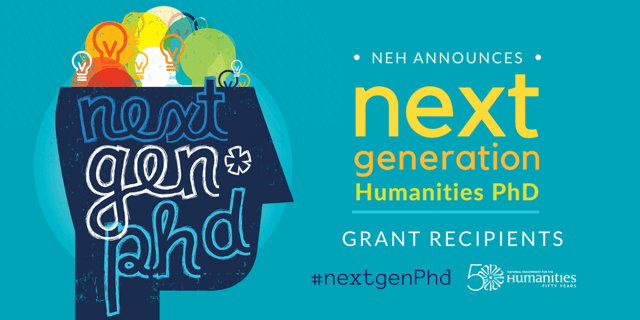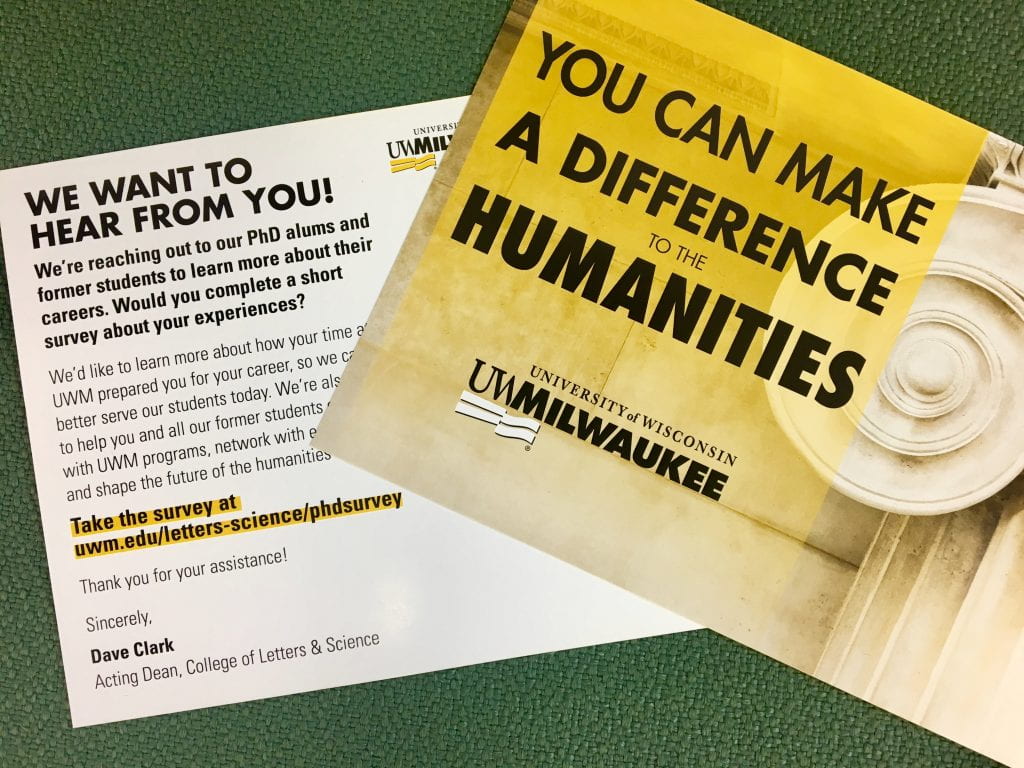Transforming the Culture of Post-Doctoral Humanities Careers


Updates
Alumni and former PhD student survey is open!
We’re reaching out to more than 600 alumni and former doctoral students in the humanities to learn more about their careers. Starting this week they’ll be receiving an email from us with a link to a short survey, or one of these postcards in their mailboxes at home. We want to learn more about how former doctoral students found their way to their current career, and we hope they can help us better understand how better to support all humanities doctoral students across the full range of possible careers. We’d also like to find out how they want to stay connected with UWM, with their fields of study, and with each other. Stay tuned for a report on the results later in summer.
If you’re an alum or former doctoral student in the humanities at UWM, we’d love to hear from you. Drop us a note at next-gen-phd@uwm.edu any time.
Graduate student and faculty surveys complete
Our thanks to all the graduate students and faculty in the humanities and social sciences who responded to our surveys about doctoral career diversity this spring. We had a phenomenal response rate. Fifty four percent of all the doctoral students who received the survey completed it, and almost forty percent of all faculty. That speaks to the level of interest in this issue across departments, and the level of commitment we’ve already learned to expect from our students and colleagues. Thank you.
Although we’re still crunching the numbers and digesting the many thoughtful responses, we can see already that these surveys are full of valuable feedback and ideas. We’ll post reports of the results later in summer. Until then, thanks again to everyone who responded, and to the hard working subcommittees that put these surveys together.
Prototyping
From the start, we’ve found it hard to balance our faculty members’ commitment to patient discussion and exchange with some of our non-academic members’ desire for more rapid action. Faculty members sometimes feel rushed toward decisions; community members wonder whether the professors will ever stop talking.
We’ve developed some useful ways to narrow down our priorities, including focus groups and three large surveys currently underway. But to make our plans more concrete in the closing weeks of our efforts, we turned to one of our planning committee members from the local business community, Matthias Jonas, a SCRUM Master and facilitator in agile workplace environments, and a consultant with Northwestern Mutual. Matthias led a three-hour session in which he took over a classroom, covered the walls with colorful charts, and guided us through activities designed to make our abstract planning more concrete. We came out of it with a prototype sample, as Matthias calls it, which we then distributed to the entire planning committee for comment. It felt like a huge step forward.
This is one example of a way in which humanities academics—including professors—can learn from practices outside the academy. How much training have humanities faculty had in design thinking methodologies or workflow management, after all? More contact with the world beyond the academy could benefit our departments too. And although participants did not entirely agree on the nature or scale of the benefits of the prototyping process, many of us were struck by how closely it resembled an active learning classroom in the humanities. In their training, facilitation, and management methods, some businesses today are working in ways that would not be unfamiliar to our doctoral TAs.
Focus Groups
We’re excited to report some results from a series of focus groups we held last month through the Zeidler Center for Public Discussion. (Thanks, Zeidler!) Part of our planning efforts involve gathering more information about career outcomes and preferences, through surveys and data collection that we’ll be reporting on in months ahead. But we also wanted more qualitative information from the various stakeholders about how they currently understand doctoral careers.
We organized a series of small focus groups made up of non-academic employers, faculty and graduate students in order to identify areas of mutual interest and benefit. We also wanted to learn more about how they communicate with each other, and how they perceive each other.
Zeidler produced a detailed ten-page report, but a few results are worth highlighting:
First, the non-academic employers clearly wanted doctoral students to have experience in organizational settings beyond the academy, whether as a part of their own research or through internships, practicums, or other means. “Get students off campus.” “Connect with community.” “Get exposure.” “Learn the culture of an organization through placements.” One noted that UWM’s public history grad students are required to do internships, and have high placement rates.
Second, non-academic employers valued doctoral students’ writing ability, but they expressed concern about their ability to adapt to non-academic audiences, shorter deadlines, briefer forms, and more collaborative processes. “Know how to…reach any audience.” “Not all about academic talk.” “Brevity is important.”
And third, non-academic employers wished for better technical skills and more quantitative literacy. “Learning how to do a spreadsheet, learning tech.” “Work with quantitative analysis.” “Data analysis.” “Financial admin courses.”
Some of this tallies with the results of other research, such as the AHA’s Five Skills for Career Diversity, but some of it suggests new opportunities. Are there ways that advising or colloquia could incorporate “small cycles to get constant feedback,” which one employer said businesses value? What would a viable, broad-based model of humanities internships look like, and how could it be sustained? And if employers want more quantitative literacy, how might that be incorporated into doctoral work? (As equivalent to a second language requirement? Through more diverse research methods? Required courses?)
We’ll be using this information to prioritize our ideas so we can build on those that promise the greatest benefit and highest likelihood of success. Don’t hesitate to contact us if you’d like to learn more.
Imagining America
We learned a lot from a panel at the Imagining America conference held in Milwaukee last weekend. UWM Professor of English Gregory Jay attended the conference, and reported back to the committee from a fascinating panel titled “Re-envisioning Graduate Education for Public Work Inside and Outside the University.” The panel draws on the work of Imagining America’s Publicly Active Graduate Education Fellows (PAGE), which several UWM graduate students have received in recent years. It featured John Saltmarsh from the New England Resource Center for Higher Education, Kush Patel from the University of Michigan’s Institute for the Humanities, and Malcolm Tariq, a Mellon Fellow at the University of Michigan.
Tariq and Kush spoke about their experiences at Michigan, where impressive efforts to support public scholarship and diversify doctoral career outcomes are well underway, especially through their Humanities PhD Project. Both spoke thoughtfully about the personal and practical challenges of doing work that might be poorly supported, little appreciated, and very different from that of one’s advisor.
Saltmarsh summarized a new book he co-edited, Publicly Engaged Scholars: Next-Generation Engagement and the Future of Higher Education, ed. Margaret Post, John Saltmarsh, et al (Stylus, 2016). His comments revealed a striking divide between doctoral education as it is most often practiced and the values of Next Generation public scholars. He made the interesting point that because some faculty seem resistant to talking about pedagogy, it might be useful to reframe discussions so that they’re about epistemology: ways of knowing rather than ways of teaching. Saltmarsh also resisted the “alt-ac” designation, given that Next Generation scholars don’t see themselves as “alternative.” Doesn’t alt-ac preserve a hierarchy of career outcomes? It does seem better to refer to diverse career outcomes instead.
With this rich conversation in mind, we wonder what it would it take to help UWM’s humanities doctoral programs be more outward-facing and publicly engaged? We have great resources on campus already, including Cultures and Communities and the Electa Quinney Institute, to name just two. But how might doctoral programs have to change: different dissertations, additional certificates, modified coursework requirements?
We’re Underway!
We had a very productive organizational meeting on Sept. 23, where we assigned subcommittees and planned our work for fall.
And we had a few lively debates already. We’ve organized our work in three subcommittees, Curriculum Development, Faculty Education, and Alumni Initiatives, but our community members pointed out that all three categories are focused on the university. How do we expect to build meaningful relationships beyond the academy if our own organization is so academic? We agreed, and immediately reconstituted Alumni Initiatives as Community Initiatives. We’re pleased that the many of our community members have volunteered to serve on this new committee. We’re already benefitting from their involvement.
We also had a lively debate about how to serve doctoral students who might decide not to complete their degrees. One of our alumni members did just that, and now has a career as a journalist, public historian, and the founder and guide of the Mondo Milwaukee boat tour of “Milwaukee’s strange, illicit, and notorious hidden history.” The planning committee was broadly in agreement that we might have to develop different strategies to support those who receive a doctorate and those who seek another career before finishing.
Finally, we debated how many students enter humanities PhD programs with the goal of finding academic work, and how open they are to other possibilities from the beginning. Opinions differed, and of course no single answer will describe every department or every university. Our doctoral student members offered to include a question about this on a survey they’re preparing for graduate students.
Some other things we’re looking into that we didn’t mention in the application: career options with internal universities at large corporations; summer internships at area companies for graduate students; partnerships with businesses with expertise in career development and training.



